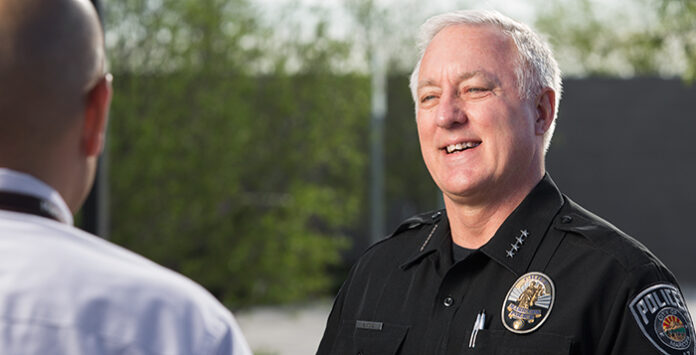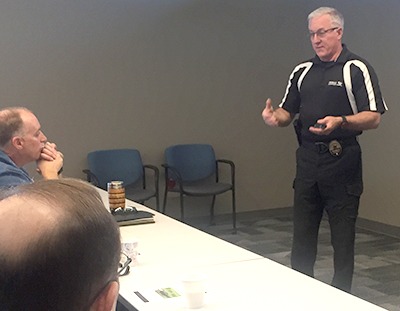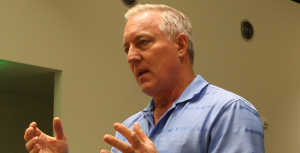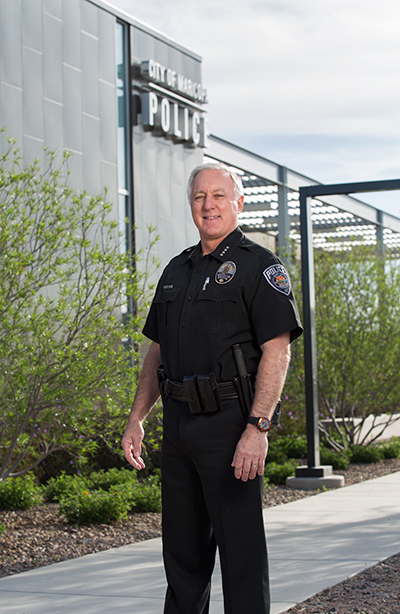
By Katie Mayer
A little more than 19 years into Maricopa Police Chief Steve Stahl’s law enforcement career, he grew disenchanted and planned to retire once he hit the 20-year mark.
At the time, Stahl was a commander with the Mesa Police Department, where morale had dipped and he didn’t see a whole lot of growth potential.
But then a new chief stepped in. Former Los Angeles Police Department Assistant Chief George Gascón brought big city-crime-fighting techniques, strong leadership and a heavy helping of hope to a department that so greatly needed it.
“When Chief Gascón came in, I said ‘I’m going to give this chief six months and see if he reinvigorates me,’” Stahl recalled.
It was worth the wait. Gascón’s leadership inspired Stahl to remain in his profession and set him on a trajectory to become the chief he is today.
“He reinvigorated what leadership should be and reignited that passion for police work,” Stahl said.
Stahl decided to stay – and many would say it’s a good thing he did. Because today – like the leader who once inspired him – Stahl has been the catalyst for change in a department that appeared to have lost its way. Through accountability, leadership and a strong vision, Stahl has boosted the morale of his rank-and-file, reduced crime and connected deeply with the community he serves.

February marked four years Stahl has served as Maricopa’s police chief. In that time, he is credited with forming broader and deeper bonds with the community, bringing world-class training and resources to his police officers, reducing Part I crimes and providing better support for victims of domestic violence.
“I think in every aspect of what he does as a police chief, he pursues the ideal of excellence,” said Maricopa City Manager Gregory Rose. “I think that permeates throughout the rest of the police department.”
Stahl’s commitment to hard work was instilled in him early. Born in the 1,200-resident town of Redfield, South Dakota, Stahl grew up on a farm and ranch where “you worked until everything is done.” School was held in a single K-12 classroom and the nearest city was 25 miles away.
“That work ethic was drilled into me early on,” Stahl said.
After graduating from South Dakota State University, Stahl managed a water bed store and fitness center. One summer, he visited some family in Arizona and “enjoyed the heck out of” himself.
“I picked up a Sunday paper and noticed one of the leading waterbed companies was hiring,” Stahl recalled. “I interviewed and flew back home…seven days later I’m in Arizona.”
Soon, he got to know his next-door neighbor, who was a Tempe police officer. The neighbor encouraged him to consider a career in law enforcement.
“I applied at Tempe and Mesa,” Stahl said, “and Mesa called first.”
During his time with the Mesa Police Department, Stahl worked in nearly every area of the department. He credits former Mesa Police Chief Frank Milstead with encouraging him to branch out.
“He taught me all the jobs you have are not going to be glamorous,” Stahl said.
At first, this was a tough pill to swallow for Stahl, who had spent 15 years on the Mesa Police Department’s action-packed SWAT team.
“He also gave me those opportunities that put a glimmer in my mind that ‘Can I be chief?’ and ‘Do I want to be a chief?” Stahl said. “I would’ve never been ready otherwise.”
Like his own police chief in Mesa, Stahl stepped into a department in 2011 in need of leadership. The department had just gone through two external audits and morale was low.
In his new role, Stahl formed a vision statement, articulated his high expectations to officers and invested in their training and equipment.
“When I came here, you could tell in briefings and ride-alongs that they craved that leadership,” Stahl said. “And it wasn’t hard to (turn things around) because they are professionals.”

He added, “Those who did what they needed to do stayed and those who didn’t went away.”
And while working on internal matters, Stahl also placed an emphasis on customer service in Maricopa. As part of his vision statement he required the officers to “make every contact excellent.” He also rolled out community engagement events such as “Coffee with the Chief,” where residents could come and have some face time with Stahl.
Chris Hashisaki, community manager at CCMC at Tortosa, said the customer service has been visible to her residents.
“I do think they are becoming more successful about creating that personal relationship with the citizens and police departments,” Hashisaki said. “We are a little ways out here, but we still get the patrol and recognition definitely from the police department and him.”
And the business community has taken notice as well.
Ace Hardware owner Mike Richey calls Stahl one of the “premier civil servants in the community.”
“I think the department clearly reflects his confidence,” Richey said. “When you’ve got somebody at the top that projects himself in the community the way Chief Stahl does, it’s a trickle-down effect – everything starts at the top.”
Although Stahl makes leadership look easy, his four years have not been without challenges. In January, an Army veteran’s widow sued the city and two police officers over the 2015 fatal shooting of her husband, who had contacted police two days earlier to talk about his post-traumatic stress disorder.
While the department has declined to talk about pending litigation, Mike Kemery, commander of the VFW, said he has been happy with Stahl and his leadership.
“One day he stopped in around lunch time at the Veterans Center, and we talked for an hour,” Kemery said. “He has been very attentive to whatever group he might be with, and he takes an interest.”

Kemery said he and his veteran victim advocate colleague have been called out to situations in the community involving veterans and have worked with police to help the veterans obtain resources.
“From a veteran’s point of view, this town is keenly aware of the veterans and they do take an interest and Chief Stahl leads the charge,” Kemery said.
Also, during a time when police departments across the country have been accused of racial bias, Maricopa Police Department has not been immune. Last year, when Maricopa police responded to a report of a jogger pushed down by an attacker described as a “black teenage male,” the department faced some scrutiny after questioning black teenagers in connection with the crime.
However, Stahl, a member of the NAACP, said he and his officers have never faced any problems related to racism and remain engaged with the black community and work closely with a civilian advisory board consisting of diverse residents of Maricopa.
“The great thing is we all have on-body cameras,” Stahl said, “so even the suspect can come in and we handle it right then and there.”
Stahl is now looking forward to even greater changes in the future, most notably, Maricopa joining the Regional Wireless Cooperative and the department taking over its own dispatching on May 5. The change means officers can now have radios reception in other parts of Arizona and communicate with other police departments.
Stahl is also working to train and promote his staff so that some day when he makes the decision to retire, there is leadership available to step up and take over.
“When I leave, if you have to look externally for a chief, then I have not done my job,” Stahl said.
Rose said he supports the chief as he prepares for the future, but hopes “he is here for a very long time.”
Although being chief means Stahl has largely sacrificed time with his wife and family, and his beloved tee times are nearly impossible to squeeze into his schedule, he calls the job “one of the most rewarding experiences I’ve ever had in my career” and said he is “blessed to be here.”
“When I walk the hallway and do ride-alongs with officers and see the light in their eyes, it reminds me of the first time I pinned the badge on,” Stahl said. “It’s all about them, not about me.”
This story appeared in the April issue of InMaricopa.





![Maricopa’s ‘TikTok Rizz Party,’ explained One of several flyers for a "TikTok rizz party" is taped to a door in the Maricopa Business Center along Honeycutt Road on April 23, 2024. [Monica D. Spencer]](https://www.inmaricopa.com/wp-content/uploads/2024/04/spencer-042324-tiktok-rizz-party-flyer-web-218x150.jpg)






![Alleged car thief released without charges Phoenix police stop a stolen vehicle on April 20, 2024. [Facebook]](https://www.inmaricopa.com/wp-content/uploads/2024/04/IMG_5040-218x150.jpg)




